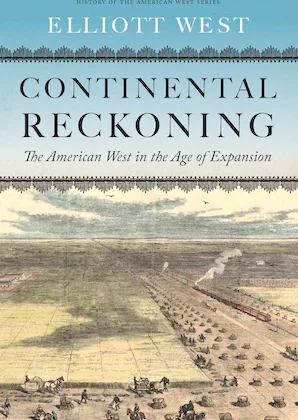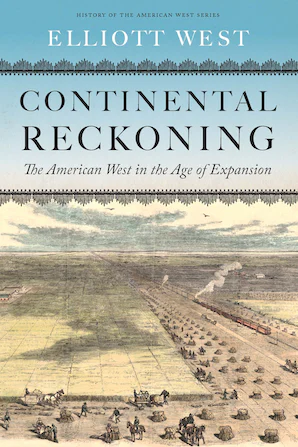

Elliott West is History Consultant at the University of Arkansas. This interview is based on his new book, Continental Reckoning: The American West in the Age of Expansion (University of Nebraska Press, 2023).
JF: What led you to write Continental Reckoning?
EW: Because I came to believe that we have to know its story if we are to understand the United States as we know it today. I have studied and taught the history of the American West for well more than fifty years. I love all of it, but I have always been especially drawn to that time that I think of as the birth of the West, the country from the Missouri River to the Pacific, as a national region. That story covers thirty years, roughly one generation, from the late 1840s to around 1880. At its start we acquired the far West, about three quarters of a billion acres, and by its end that area had come into focus as a distinctive part of our nation. The emerging West, as much as the Civil War that came midway through the that emergence, fundamentally shifted the course of American history. I was compelled to tell that important story as well as I could. Continental Reckoning is the result.
JF: In 2 sentences, what is the argument of Continental Reckoning?
EW: Taken strictly on its own terms, the birth of the West was vital to the course of American history—the acquisition and exploration of territory nearly the size of modern India, the nation’s opening onto the Pacific world, the discovery and exploitation of vast resources, starting with California gold, the defeat and dispossession of that land’s inhabitants and the imposition of a racial order, and the environmental transformation of more than two million square miles. When we pull back to a wider view, its history is also inseparable from the transformation of the United States into the modern nation we know today—an economic powerhouse, a global leader in science and other fields, and a people in continuing debate over human rights and human worth.
JF: Why do we need to read Continental Reckoning?
EW: Besides the points made above, the birth of the West is just a great American story. It is peopled with the usual characters of popular culture—cowboys, Native warriors and prancing cavalrymen, overland travelers to Oregon and California, sturdy homesteaders and more—but there were so many others beyond that common view: scientists making fundamental breakthroughs in a variety of fields, artists and photographers, explorers and engineers and camel-drivers, women beaten down by overwork and liberated by new opportunities and by favorable laws, including for divorce. There were unexpected turns of fate, including what was at the time the greatest gold strike in human history about two hundred hours before the signing of the treaty that gave us California and the Southwest. There were genuine horror tales of genocidal mayhem and the brilliant successes of Indian peoples adjusting to their new circumstances. In telling all this I have drawn on fifty years of collecting the accounts of the people themselves. I have tried to give this history a somebodyness by allowing them to have their say in their own words from the time.
JF: Why and when did you become an American historian?
EW: I grew up in a family of journalists and I majored in journalism. But I always loved history (journalism was just “history in a hurry,” my editor-father told us), and when I was offered a graduate fellowship in history at the University of Colorado, I jumped on the chance. There I fell in love with the West and its history. I caught the bug, and it is still with me.
JF: What is your next project?
EW: While researching Continental Reckoning, I was intrigued by the understudied topic of science in the opening West, and I was also struck by the need for more attention to religion, not histories of particular denominations but rather the place of religion in the lives of westerners, both Natives and newcomers and how they interacted. I will be pursuing both topics.
JF: Thanks, Elliott!